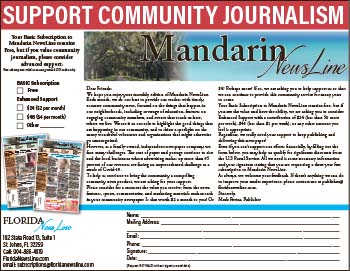By Lesley Arrandale
mail@floridanewsline.com
Summer is almost here after record-breaking spring temperatures and, as of early May, a continuing rainfall deficit in northeast Florida. I’m now wondering what the summer may bring. The hurricane season predictions (out of Colorado State University) are for an El Nino weather pattern possibly kicking in during the summer, and if it does we could see slightly fewer storms than average, with sea temperatures and wind patterns keeping more of them out in the Atlantic. In the meantime, the Okefenokee Swamp West Mims fire has been burning for weeks, with little rain to help the firefighters; rain is sorely needed.
Some of you may have been to the Duval County Master Gardeners’ First Annual Plant Sale and Expo – to give the occasion its full title. With over 500 visitors, activities for the kids, seminars for the adults, and plenty of plants, we feel it was a success, and you can expect sale number two next spring.
Check out the May/June edition of A New Leaf newsletter, where you’ll find details of upcoming courses, dates, and costs (http://duval.ifas.ufl.edu/documents/nleafMayJunel.17mail.pdf). In June there will be three very practical Florida-Friendly adult-only camps. If you’ve ever hankered after a worm bin (to make rich compost), a water barrel (to conserve water), or to grow microgreens (for tasty salads), at least one of these camps is for you.
Every year members of the public are invited to apply to become Master Gardeners, and this year the application deadline is June 19. For more information see A New Leaf, as well as http://duval.ifas.ufl.edu/lg_master_gardener.shtml. The classes cost $100 and will cover just about anything you wish to know about plants, their culture, their value in our lives, and how we can participate and spread the knowledge and enjoyment to the public. Once qualified, master gardeners pay back, giving 75 volunteer hours in the first year (35 hours in following years) and take a minimum of 10 hours of continuing education, which is always time well spent.
Down in St. Johns, at the county Extension Service arboretum, some of the Master Gardeners are growing beautiful display gardens, using many All-American Selections® plants (http://all-americaselections.org/garden-display-details/?Contact_ID=7634). These are seed-grown annuals, perennials, vegetables, and herbs which have been found to be outstanding performers. Some are from as far back as 1934, which illustrates how long this not-for-profit organization has been working to improve and expand our plant choices, as well as how good plants stand the test of time.
In my yard I’ve been seeing plenty of gulf fritillary and zebra longwing butterflies, thanks to the native maypop vine, Passiflora incarnata (which “maypop” up anywhere!). They both lay their eggs on tender new shoots, but the zebra longwing prefers shadier areas, so they aren’t exactly in competition.
Pipevine (Aristolochia elegans) is not a native vine, but will feed the caterpillars of the gold-rim swallowtail. Unfortunately the pipevine swallowtail won’t be attracted to this plant, preferring the native pipevine, Aristolochia tomentosa, or wooly pipevine. And A. elegans, although sporting a fascinating flower, is an over-enthusiastic self sower and really does need to be kept in check. The native Gaillardia pulchella or blanketflower attracts pollinators. Although not the most elegant of plants, this hardy annual is full of flowers for months at a time and a valuable resource for our native insects.
For those of us still visiting the nurseries on the lookout for that new and beautiful flowering plant we just can’t turn up, A New Leaf newsletter has advice about what can be planted successfully in these increasingly hotter months, so why not check it out before that trip? Happy gardening.
Lesley Arrandale is a Master Gardener with the Duval County Cooperative Extension Service/City of Jacksonville Agriculture Department, which is a partnership between the United State Department of Agriculture (USDA), the University of Florida Institute of Food and Agricultural Sciences (UF/IFAS) and the City of Jacksonville.








